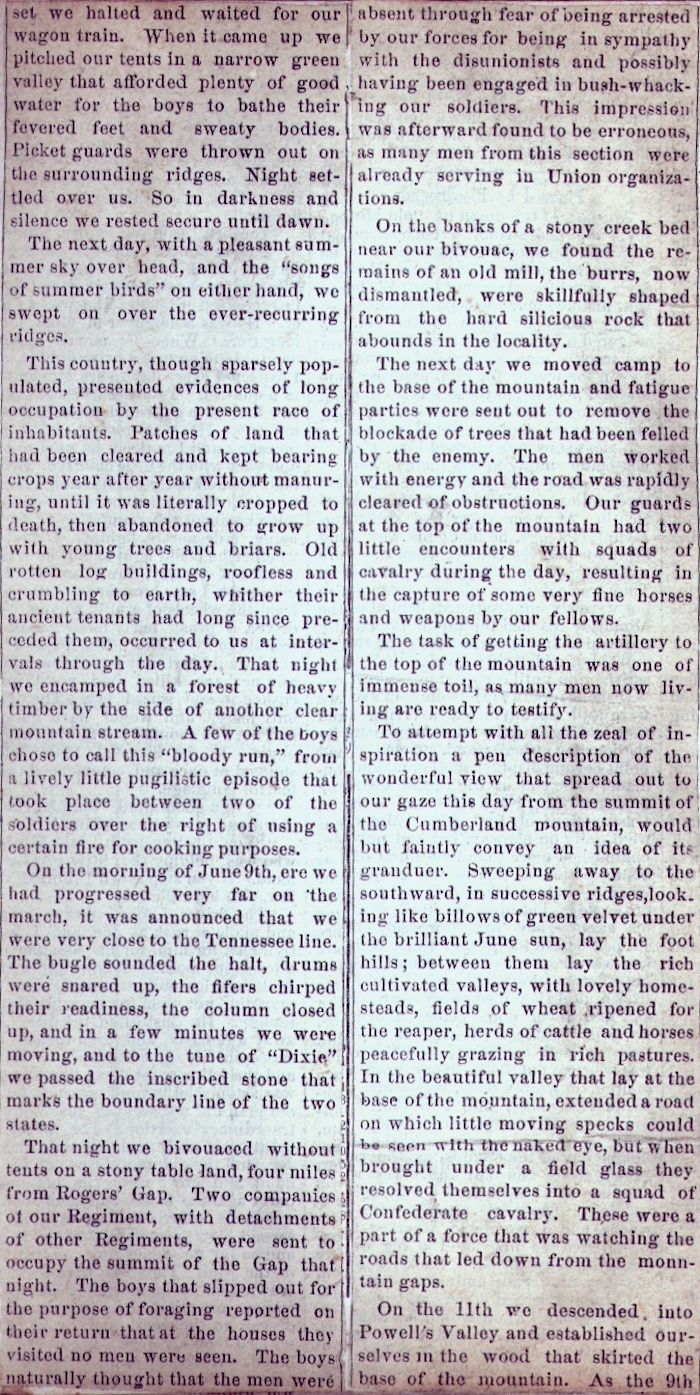| Camp & Field Page 18 | Camp & Field Index Page | 16th OVI Home Page | Camp & Field Page 20 |
The Camp & FieldArticles by Theodore Wolbach |
 Cpl. Theodore D. Wolbach |
The following image is taken from a book titled "Mortality and Statistics of the Census of 1850" in which it is believed retired Captain Rezin H. Vorhes, Company H, pasted over the pages a series of articles written by Cpl. Theodore D. Wolbach, Company E, titled "Camp and Field" and published, by chapter, in the Holmes County (Ohio) Republican newspaper from February 24, 1881 to August 17, 1882. The articles tell the story, in great detail and color, of the 16th OVI, from the inception of the 3-year regiment in October, 1861, through all its camps, battles and marches until it was disbanded on October 31, 1864. The articles pasted in the Vorhes book cover the first 35 chapters, published through October 20, 1881. All the remaining chapters were recently found in a Holmes County library by researcher Rob Garber who obtained copies, performed the transcriptions and provided to this website and which are also presented here, thus providing the complete work by Theodore Wolbach.
Throughout these articles click on the underlined white text for additional details.
The webauthor thanks 16th Ohio descendant Rob Garber for his excellent research on the Camp And Field articles and for performing the tedious digital transcription of those articles found on each page. The transcriptions were made to reflect the original articles verbatim, misspellings and all. Rob is the 3rd great nephew of Capt. William Buchanan, Company F, 16th Ohio, who served in the 90-day regiment as a private, re-enlisting in the three year regiment, and eventually making the rank of Captain of Company F. Thanks Rob!
Page 19 - Chapter 11 - June, 1862
 |
set we halted and waited for our wagon train. When it came up we pitched our tents in a narrow green valley that afforded plenty of good water for the boys to bathe their fevered feet and sweaty bodies. Picket guards were thrown out on the surrounding ridges. Night settled over us. So in darkness and silence we rested secure until dawn. The next day, with a pleasant summer sky over head, and the This country, though sparsely populated, presented evidences of long occupation by the present race of inhabitants. Patches of land that had been cleared and kept bearing crops year after year without manuring, until it was literally cropped to death, then abandoned to grow up with young trees and briars. Old rotten log buildings, roofless and crumbling to earth, whither their ancient tenants had long since preceded them, occurred to us at intervals through the day. That night we encamped in a forest of heavy timber by the side of another clear mountain stream. A few of the boys chose to call this On the morning of June 9th, ere we had progressed very far on the march, it was announced that we were very close to the Tennessee line. The bugle sounded the halt, drums were snared up, the fifers chirped their readiness, the column closed up, and in a few minutes we were moving, and to the tune of That night we bivouacked without tents on a stony table land, four miles from Rogers' Gap. Two companies of our Regiment, with detachments of other Regiments, were sent to occupy the summit of the Gap that night. The boys that slipped out for the purpose of foraging reported on their return that at the houses they visited no men were seen. The boys naturally thought that the men were |
absent through fear of being arrested by our forces for being in sympathy with the disunionists and possibly having been engaged in bush-whacking our soldiers. This impression was afterward found to be erroneous, as many men from this section were already serving in Union organizations. On the banks of a stony creek bed near our bivouac, we found the remains of an old mill, the burrs, now dismantled, were skillfully shaped from the hard silicious rock that abounds in the locality. The next day we moved camp to the base of the mountain and fatigue parties were sent out to remove the blockade of trees that had been felled by the enemy. The men worked with energy and the road was rapidly cleared of obstructions. Our guards at the top of the mountain had two little encounters with squads of cavalry during the day, resulting in the capture of some very fine horses and weapons by our fellows. The task of getting the artillery to the top of the mountain was one of immense toil, as many men now living are ready to testify. To attempt with all the zeal of inspiration a pen description of the wonderful view that spread out to our gaze this day from the summit of the Cumberland mountain, would but faintly convey an idea of its granduer [sic]. Sweeping away to the southward, in successive ridges, looking like billows of green velvet under the brilliant June sun, lay the foot hills; between them lay the rich cultivated valleys, with lovely homesteads, fields of wheat ripened for the reaper, herds of cattle and horses peacefully grazing in rich pastures. In the beautiful valley that lay at the base of the mountain, extended a road on which little moving specks could be seen with the naked eye, but when brought under a field glass they resolved themselves into a squad of Confederate cavalry. These were a part of a forced that was watching the roads that led down from the mountain gaps. On the 11th we descended, into Powell's Valley and established ourselves in the wood that skirted the base of the mountain. As the 9th |
| Camp & Field Page 18 | Camp & Field Index Page | 16th OVI Home Page | Camp & Field Page 20 |